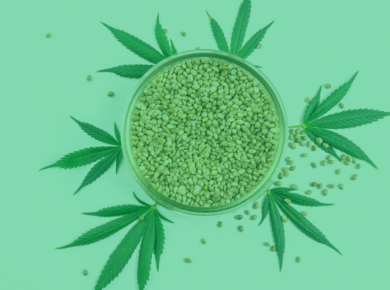As the hemp industry continues to become transparent, the number of Kosher certified hemp products is growing.
Kosher certified hemp/CBD products are growing increasingly popular among consumers worldwide. Obtaining Kosher certification is actually easier than you might think.
The most commonly Kosher certified hemp/CBD products include Capsules, CBD oil, Gummy bears, Isolate, Tinctures and Topicals. Here is what you need to know to achieve this.
While the hemp plant is considered to be inherently Kosher, many other Hemp & CBD products use additional ingredients that may require an acceptable Kosher certification.
Looking for Kosher Products? Join Kush.com Today >>
CBD Oil and Isolate:
This is often produced using either an ethanol or CO2 extraction process. Ethanol would require a Kosher certificate from the manufacturer and is readily available in the USA. A CO2 or Supercritical extraction process poses no issue for Kosher certification. The steps of winterization, distillation do not pose an issue either.
If this is then processed into Isolate at a Kosher certified facility dedicated to such products, there is no issue posed by the subsequent production process.

Capsules:
When a company seeks to produce a Kosher certified capsule product, not only must they ensure that all the ingredients being used to fill the capsule are Kosher certified, the capsule itself must be Kosher certified as well.
Vegetable capsules are commonly used for Kosher products as Kosher consumers cannot consume gelatin unless it is made under Kosher certification – something that is more expensive than traditional sources of gelatin due to the manner in which Kosher gelatin must be produced.
The facility at which the encapsulation is done would also need to be supervised and visited by the Kosher certification agency just like any other manufacturer. Often, these facilities are pharmaceutical companies and are already familiar with Kosher requirements.
Looking for Kosher Products? Join Kush.com Today >>
Candy, Chocolate and Gummy Bears:
Consumers continue to seek out more than just CBD Oil or Hemp. As it continues to make inroads into more traditional markets, more and more food products are now being made with CBD or Hemp.
As a food item, many additional ingredients are typically used including many Kosher sensitive ones such as:
Natural and Artificial Flavors: Flavors can be comprised of a myriad of ingredients that can involve animal derivatives, chemicals as well as other Kosher-sensitive natural and synthetic materials – many of which require Kosher certification. They can also be processed on shared equipment that may pose an issue for Kosher compliance.
Colors: These can often be spray dried. Spray dryers can be easily used for non Kosher materials – something that would render subsequent products made on the same equipment non-Kosher. Colors can often be derived from either grapes, fermentation or carmine (insect). These can pose Kosher certification challenges.
Glycerin: Even if vegetable based, it is often produced or refined on equipment shared with animal derivatives – something that would render the vegetable glycerin to be non-Kosher.
Citric Acid or Xanthan Gum: As products created through fermentation, these generally would need to be Kosher certified to be used in a Kosher certified product to ensure no non-Kosher compliant material was used in their creation.
Topicals:
Stearates, Tocopherol (Vitamin E) and Oils are a concern. While not for consumption, formal certification warrants a higher standard than a product not formally certified.
Stearates & Oil: These may not be vegetable-based and/or can be processed on equipment that was used to produce animal derived products. This would potentially render the vegetable-based product to be considered non-Kosher.
Tocopherol (Vitamin E): This can be processed on equipment used to process animal derivatives.
Tinctures:
Often, companies purchase CBD Extract and then blend it with Kosher ingredients such as
essential oils and flavors. While these might be Kosher, you must ascertain that the extract
itself is Kosher certified.
Essential Oil: Essential oils that are 100% pure and steam distilled are considered to be Kosher.
Manufacturing Hemp & CBD Products:
As a manufacturer, you would need to address the following questions when you begin to consider Kosher certification:
- Do you allow other companies to bring in materials and produce at your facility?
- Do you share equipment between product lines that are used in a heated fashion?
- Do you have a separate area and set of equipment for R&D?
- Do you have systems in place that monitor incoming ingredients and keep production records?
- Do you utilize third party, offsite co-packers to help with the production of your products?
Generally speaking, the Kosher certification agency certifies the manufacturing facility as a whole. As such, all ingredients present at the facility would need to be Kosher compliant and all products produced onsite be done so in a manner that does not compromise the Kosher status of the facility.
Looking for Kosher Products? Join Kush.com Today >>
Kosher certification is granted to facilities that may not be 100% dedicated to Kosher production and in such cases, a detailed Kosher certification program is drawn up to ensure it can be maintained properly while allowing the manufacturer to operate as needed.
Steps to Obtain Kosher Certification
1. Review – the process involves reviewing all ingredients used at the facility as well those used in the product itself. Reviewing all products produced at the facility as well as those to be certified. Reviewing the facility for any concerns such as shared kitchen/equipment, compatible ingredients, operating practices and the production process.
2. Quote – the quote is generally a flat, annual fee that includes all costs such as ongoing inspections, support, Kosher certificate/Symbol etc. At times, there is a one time Initial Inspection fee and/or Kosherization.
In certain production facilities, there is a fee for Kosherization and per Production day should onsite supervision be Required during Kosher production.
Looking for Kosher Products? Join Kush.com Today >>
3. Inspection – the inspection is where the Rabbi conducts an onsite review of the facility which confirms the ingredients disclosed during the application process are in fact those found onsite.
Additionally, the Rabbi reviews the production process and facility layout to confirm it is in compliance with Kosher Production Guidelines. As necessary, the Rabbi will provide a written Kosher SOP for the facility to provide clear guidelines, how to best maintain a successful Kosher program.
Some agencies such as EarthKosher provide a Kosher Process Integration Manual (KPI) which is a “Kosher 101” on Kosher Production as well as onsite, hands on training to the key team members who will be responsible for managing the Kosher certification program.
4. Kosher Certificate and Symbol – The Kosher Certificate and Symbol are then issued. The Kosher Certificate lists all products certified, and can be broken down by SKU, size, brand etc.
The appropriate Kosher symbol is added to every product label as necessary. This testifies to both consumers and industrial clients, that the product is Kosher certified. A copy of every product label bearing the Kosher Certification symbol is reviewed by the Kosher agency to ensure it is displayed correctly.
5. Follow up – Throughout the remainder of the contractual year, there are follow up visits as necessary to conduct spot checks and meet to discuss any changes or updates.
New products, labels or ingredients can and should always be submitted to the agency for advance approval.
The goal of the Kosher certification agency is to have a mutual, successful working relationship that ensures that the manufacturer’s capabilities are not hindered while allowing their products to be Kosher certified.
Looking for Kosher Products? Join Kush.com Today >>
About the Author

Rabbi Yehuda Goldman, CEO of the EarthKosher Kosher Certification Agency, works with companies seeking Kosher, Vegan, Paleo and non-GMO certification in over 40 countries worldwide. Based in Boulder, EarthKosher specializes in certifying hemp/CBD companies. He welcomes your comments/questions at: ygoldman@earthkosher.com



